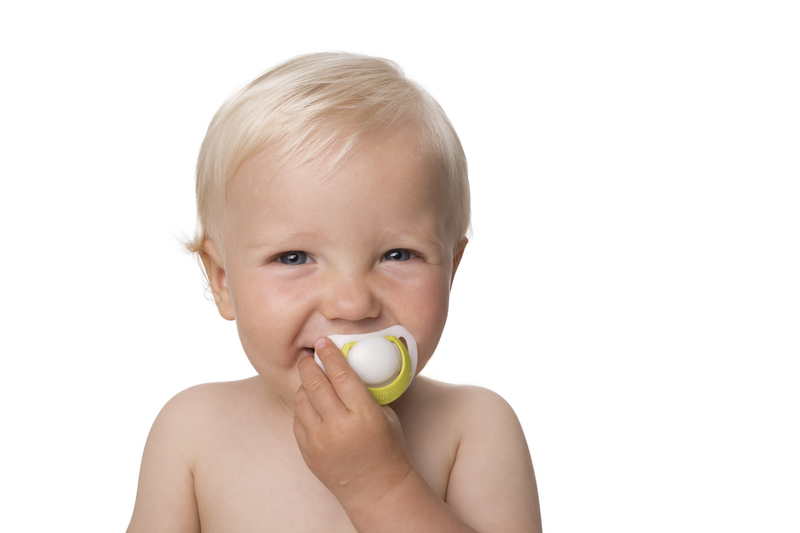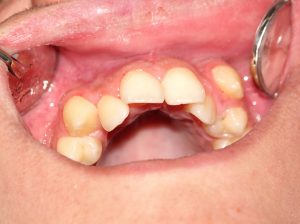Pacifiers and Teeth
Dental Laser Treatments
February 1, 2019How To Properly Brush Your Baby’s Teeth
February 15, 2019
Most young children suck on pacifiers, or binkies, to calm themselves. But as a child’s teeth begin to develop, pacifiers can have a detrimental effect on the shape and location of their teeth. Not only can they change your child’s mouth structure, but they also can be home to tooth decaying bacteria that can damage children’s vulnerable teeth. Learn how pacifiers affect your child’s growing teeth and when it is time to get rid of them through these tips!
Children’s Mouth Structures
When it comes to your child’s mouth health, it’s important to know what can affect their sensitive developing mouth structures and how you can prevent disease. To maintain healthy and strong teeth, it is important to commit to healthy practices and good oral hygiene early on. For children, the formation of their baby teeth is the first step in their oral hygiene experience. Baby teeth start forming before the child is born, but eruption patterns very from child to child. Most children will see their first tooth erupt at around 4 months, with their other teeth following suit fairly quickly afterwards. Baby teeth, commonly known as primary teeth, are important to maintain because decay in baby teeth can affect the development of permanent teeth later on and also create the path for permanent teeth to follow whenever they begin to erupt. Additionally, baby teeth are important for speaking and eating in young children and allow for normal jaw and muscle development. Your child’s developing baby teeth are important for their overall oral health, and it is vital that you can recognize the symptoms of misaligned teeth that commonly occur through your baby’s most favorite item: the pacifier.
Pacifiers and Baby Teeth
Pacifiers, or binkies, are one of the first things that babies are given after birth. Many times, children will suck on their pacifier throughout toddler and even preschool age. Sucking is one of an infant’s natural reflexes as they try to learn more about their world. Sucking on a pacifier provides a child a sense of security during difficult times, such as whenever they are separated from a parent, in a strange environment, or surrounded by strangers. Thumb-sucking and pacifiers induce relaxation in young children, which can help them fall asleep easier. For this reason, they are a popular item for parents to give their children. While pacifiers offer relief and comfort to distressed or unhappy children, they can cause extreme dental problems that prevent your child’s mouth from developing properly, especially in regards to their teeth.
The long-term use of pacifiers affects the shape of the mouth and the alignment of the teeth as children’s jaws grow around anything that is held repeatedly within the mouth. Overusing pacifiers can have the same effect on your child’s mouth as thumb-sucking, which also affects the development and placement of teeth. Many children who used pacifiers for an extended amount of time have developed bite problems as their upper front teeth tipped forward and became crooked. Other symptoms of excessive pacifier use include changes of the roof of the mouth and the front teeth not meeting when the mouth is closed. As mentioned, pacifiers affect a child’s mouth similar to thumb-sucking, but it usually is an easier habit to break as pacifier use is easier to monitor than thumb-sucking.
How To Protect Your Child’s Teeth
Pacifiers aren’t all that bad, but their use needs to be monitored. It is recommended that a child have their first dental exam after the first tooth erupts or by their first birthday. Having your child meet with a dentist early on can allow for malformations to be discovered and a care plan to be developed to protect your child’s teeth before any pacifier damage has occurred. If you do decide to give your child a pacifier, avoid dipping it in any sweet liquids, like sugar or honey, because this can cause tooth decay as the sugary liquids sit on your child’s teeth for an extended period of time. It is also advised to use one-piece pacifiers without liquid interiors, gadgets, or moving parts, and to clean them regularly as you can since they are an easy target for fast-growing bacteria. Try not to attach any pacifiers by strings to your child’s clothes because a child can easily get it caught on something and forcefully pull a pacifier out, which can cause tooth damage.
One of the best ways to wean your child off of their pacifier is through encouragement and praise for whenever they choose not to use their pacifier. Instead of scolding your child for sucking on their pacifier, praise them whenever they are not using it. Scolding your child for using a pacifier can actually increase their likelihood to use it as they try to deal with the reprimand. For better results, you can try giving a reward for each night they go without a pacifier through the use of a star chart or some program that monitors when they use a pacifier and when they don’t. If your child tends to suck on their pacifier whenever they’re feeling stressed out, try to avoid any stressful situations, if possible, and offer plenty of comfort.
Tips For Starting Off
Proper pediatric oral care is one of the most important milestones that a child should complete during their early years. Baby teeth set the stage for future adult teeth and as such, should be protected against all forms of jaw and teeth-damaging items. Along with monitoring your child’s pacifier use, make sure to give them healthy food options that avoid added sugars and will provide them with the vitamins that their teeth need to stay strong and healthy. Once your child’s first tooth erupts, begin brushing it and all others that appear. As the teeth grow closer together, help your child floss between each tooth to remove any plaque that may be building there. Call Hardy Pediatric Dentistry & Orthodontics at (720) 887-6003 for information about how to improve your child’s oral health!